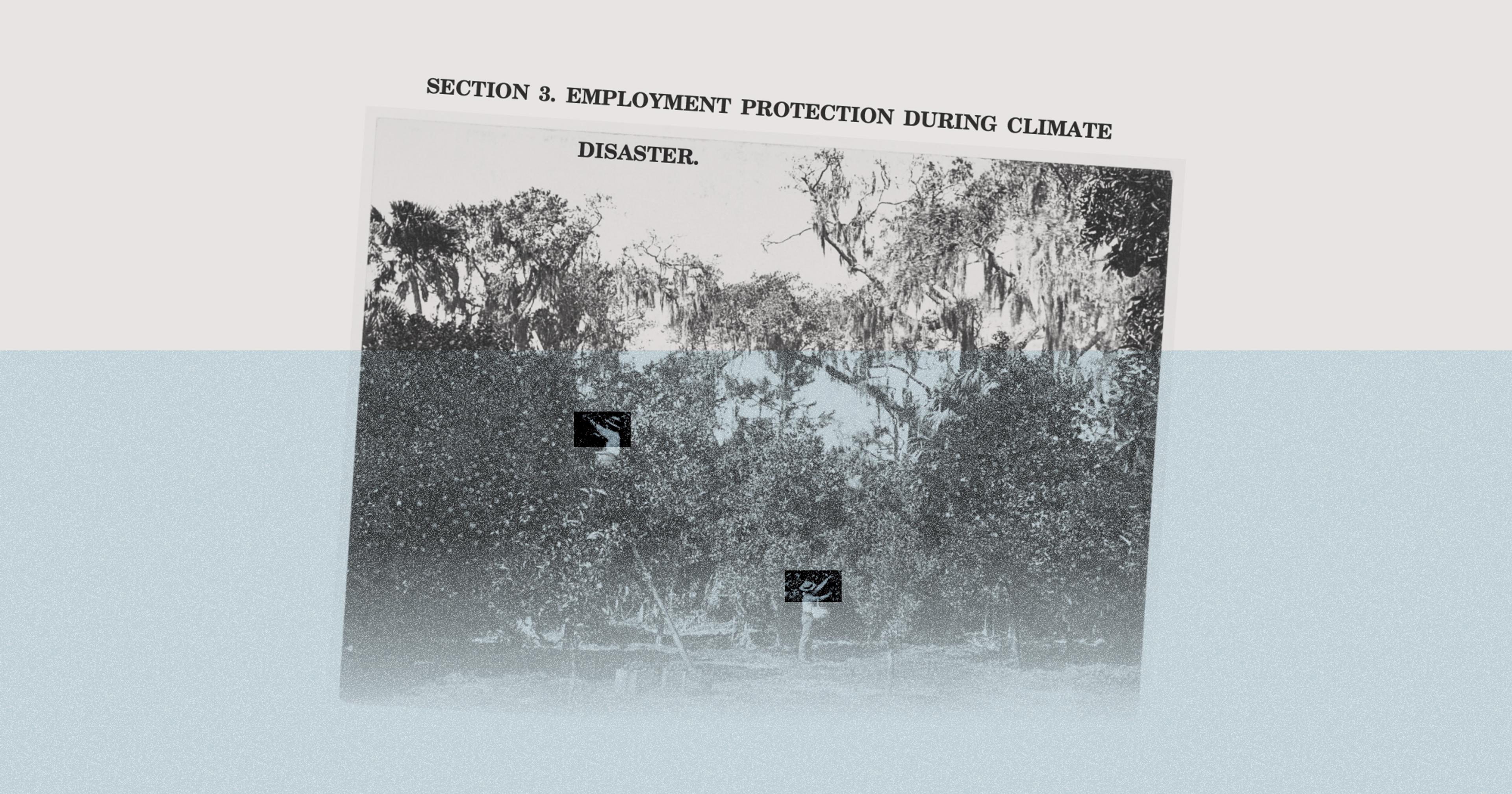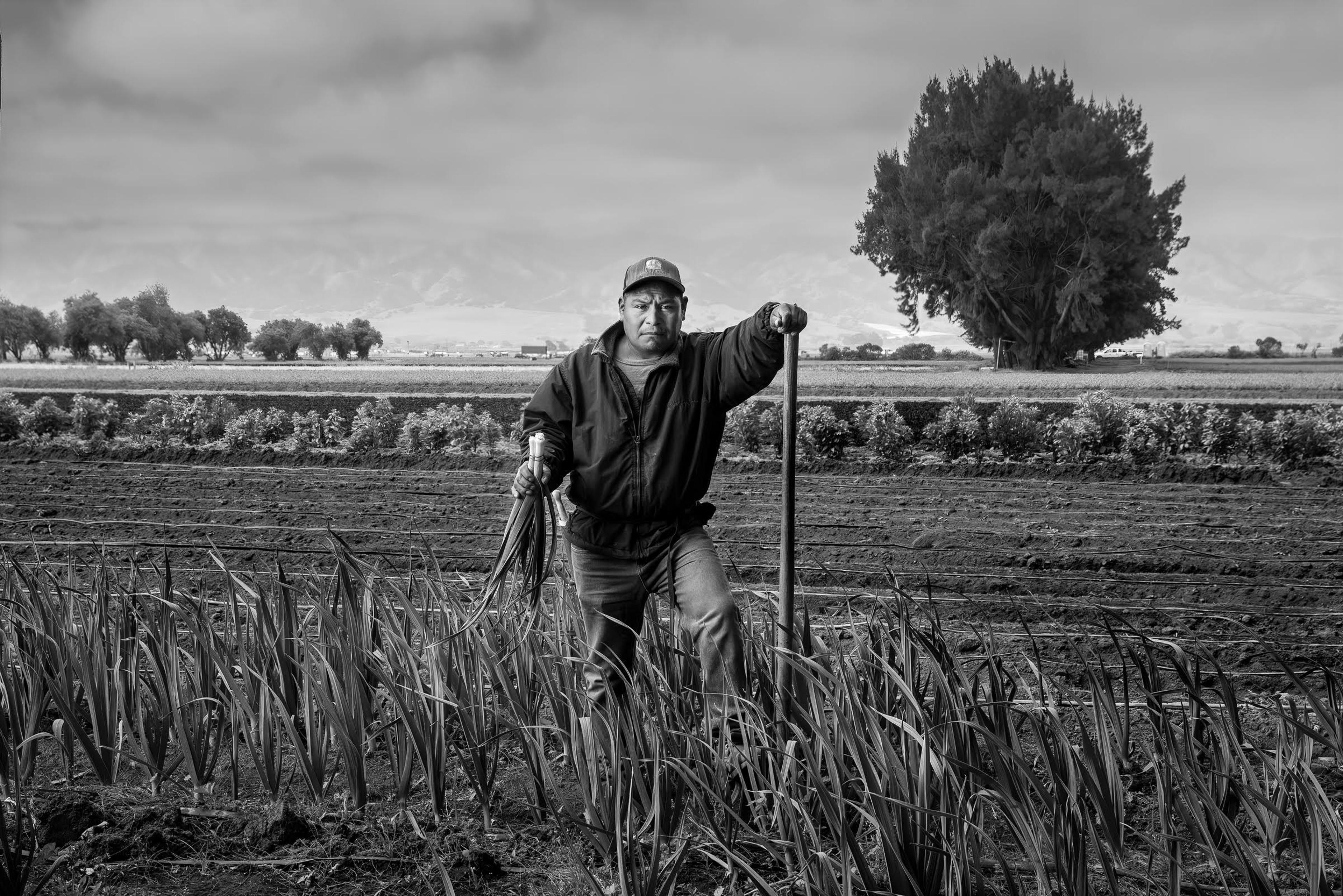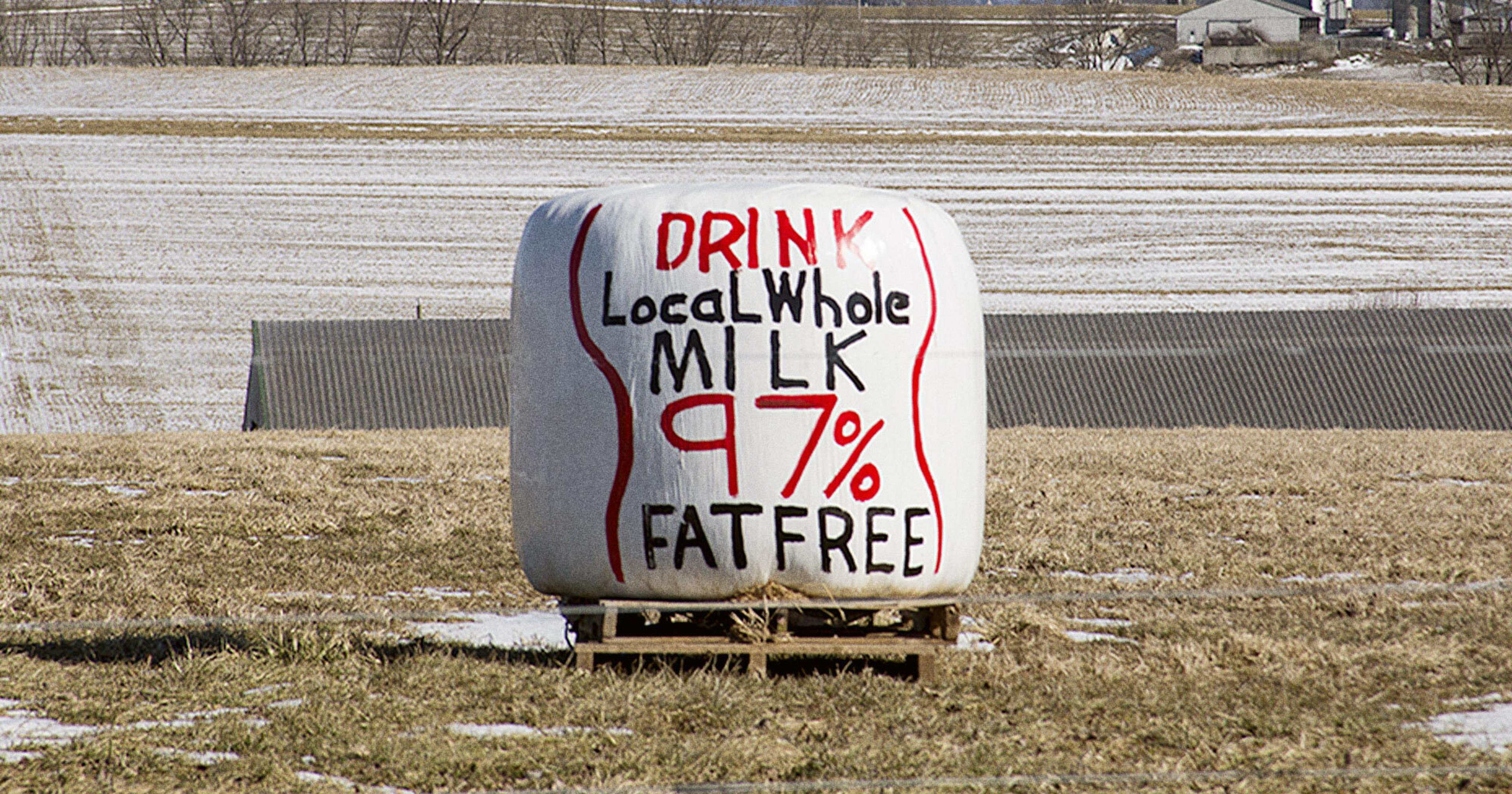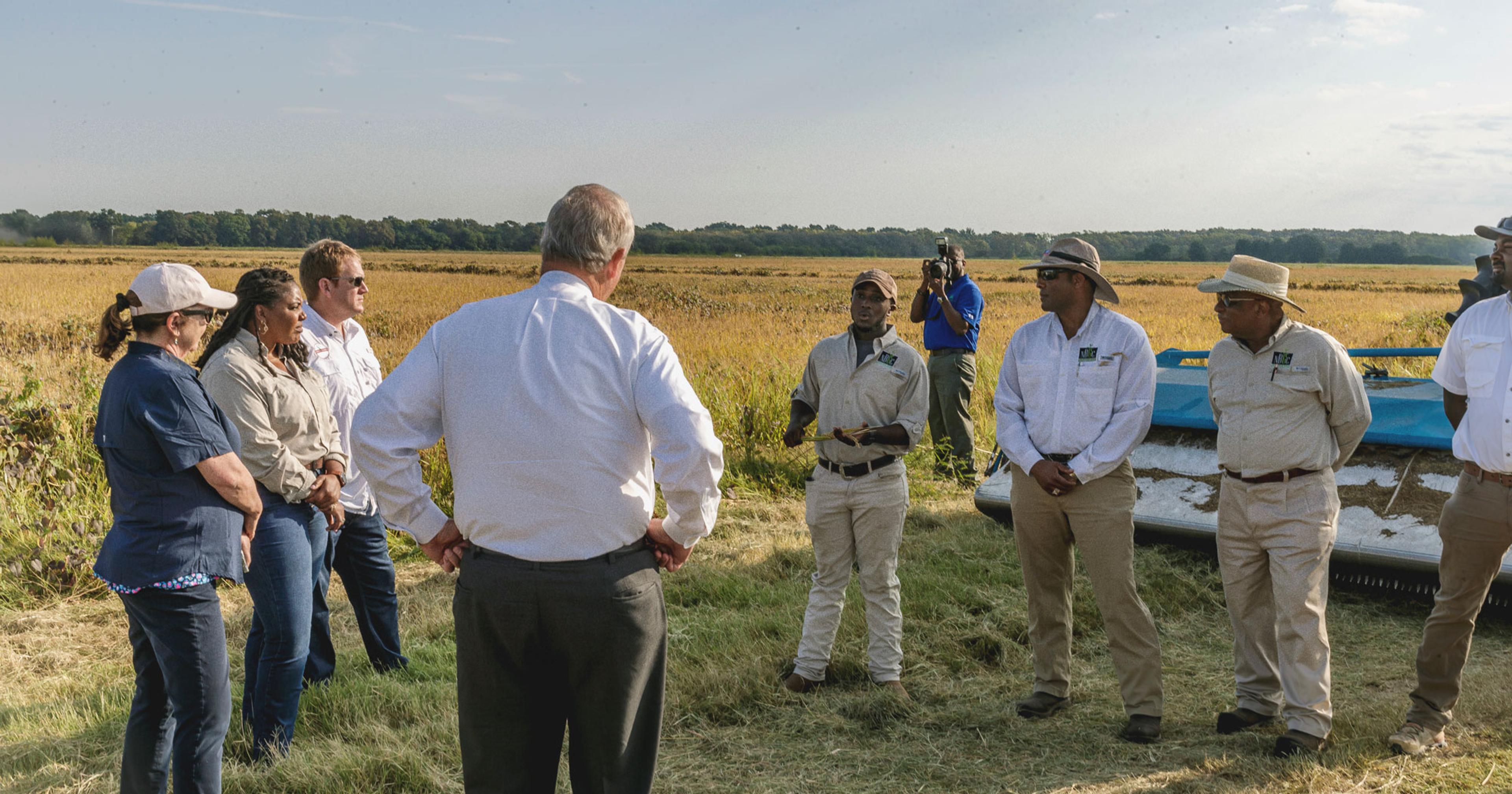Research shows that farmworkers are often exposed to dangerous chemicals with little protective equipment or recourse when they get sick. A slate of bills in the House and Senate could help.
Yesica was pregnant with her daughter Magdalena when she was transferred to a pesticide mixing position at the Central Florida ornamental plant laboratory where she had been working.
She was not provided personal protective equipment. Fearing the potential health risks for her and her unborn baby, Yesica (who requested to keep her last name anonymous for fear of retaliation) tried to safeguard herself by covering her face with a T-shirt. It likely did not help.
A couple of months after Magdalena was born, she was diagnosed with craniosynostosis, a condition in which the bones of the skull prematurely fuse together, causing issues with brain and skull development. At four months old, Magdalena’s skull was cracked open to fix the problem. For an entire year, she was forced to wear a helmet to protect her growing brain.
The experience was grueling for Yesica, both emotionally and financially. “My plan was to have the baby and go back to work in the nursery,” said Yesica. “When I realized my baby was going to need special care, I had to stop working — and I was already living in a difficult financial situation.”
Yesica can’t know for sure if Magdalena’s health problems were related to the chemicals she was mixing, but a growing body of research has been correlating exposure to pesticides with a potential array of health problems — and possibly death — in both the agricultural workers who are directly exposed and their children. In spite of increasing evidence of problems, little is being done to protect them.
While there are laws intended to help protect workers and local communities from exposure, overall pesticide oversight is a hodgepodge of regulations between state agencies and the Environmental Protection Agency (EPA). Most enforcement ends up falling on individual states, creating inconsistencies in compliance across the country. A report by Vermont Law and Graduate School’s Center for Agriculture and Food Systems and Farmworker Justice found that current regulations not only fail to sufficiently protect workers from harmful exposure but that “compliance with current protections appears woefully low.”
Oftentimes, the report found, workers like Yesica are not provided with personal protection equipment as required or not trained on how to handle pesticides the way the regulations say they should be. Required periods of re-entry to recently sprayed fields are not followed and decontamination stations with soap, water, and disposable towels are often not available.
In the rare cases where penalties have been levied against growers for violations, repercussions are minimal. Of the 984 penalties levied specifically for agricultural violations in California between December 2019 and December 2021, “86 percent were at or below $500,” according to the report.
This lack of compliance and enforcement is rooted in larger systemic issues in agriculture. Farmworkers, many of whom are undocumented or on H-2A guest worker visas, rarely report exposure incidents and suspected violations due to “fears of deportation or blacklisting if they speak out against employer abuse,” according to researchers.
“Compliance with current protections appears woefully low.”
And even if workers do report violations, experts claim that existing rules aren’t strong enough to sufficiently protect them in the first place. But a new slate of bills is attempting to fill in some of those gaps.
In December, the fifth update to the 2004 Pesticide Registration Improvement Act mandated additional improvements and funding for programs paid via a fee paid by pesticide companies. It provides direct funding to community-based farmworker organizations and other programs to help train farmworkers on the risks and proper handling of the pesticides they are applying and for the diagnosis and treatment of pesticide-related illnesses. The most significant change, however, is that it requires pesticide companies to phase in bilingual labels to help make Spanish-speaking workers more aware of these risks and how to prevent exposure.
This new labeling requirement, which is slated to start going into effect in December 2025, could have helped Yesica during her time at the nursery. She still does not know what pesticides she was mixing during her pregnancy or if she was following the proper protocol. “If the labels were in Spanish, I could’ve been able to read the precautions and maybe I would’ve been able to protect myself better,” she said.
Even so, many farmworker advocates say far more needs to be done to protect laborers from the dangers of pesticide poisoning including bans on the most toxic chemical groups. One of the main targets right now is a complete ban on a class of pesticides known as organophosphates.
The pesticides, which were created in the mid-1800s but didn’t become popular in agriculture until the late 20th century, are one of the most widely used in the market. They’re sprayed on a wide range of crops including celery, bell peppers, strawberries, grapes, spinach, lettuce, cucumbers, domestic blueberries, potatoes, and many fruit trees.
It is estimated that 3 million people around the world are exposed to organophosphates each year, accounting for around 300,000 deaths. According to the Center for Disease Control’s National Environmental Public Health Tracking Network, there were over 93 thousand reported pesticide exposures and 17 deaths in the United States in 2017 alone. While the CDC’s numbers include chemicals found in household products, at home, in the environment, and poisonings from foods and beverages, the majority tend to come from agricultural pesticides.
“It’s especially bad for farmworkers who don’t have healthcare, aren’t wealthy, and don’t have access to special programs for children with these issues.”
During World War II, the Nazis developed organophosphates as neurotoxins for chemical warfare. “They function the same way in both their target and humans,” said Margaret Reeves, a senior scientist for Pesticide Action Network North America. “They disrupt the body’s ability to block acetylcholine, a fundamental hormone that regulates nerve action.”
Exposure — which most often happens through the skin but can also occur through aerosol drift, food, or contaminated drinking water — can lead to immediate diarrhea, nausea, vomiting, sweating, muscle tremors, and confusion. This can happen within minutes and take weeks to resolve. Proper safety precautions, such as personal protective equipment, adherence to required restricted-entry intervals, and decontamination sites, could prevent these exposures. However, these legal requirements oftentimes aren’t followed or enforced due to murkiness in the pesticide regulatory structure.
The lack of enforcement is one of the reasons why advocates and the Vermont Law report have called for Congress to restore partial jurisdiction over pesticide-related occupational regulations to the Occupational Safety and Health Administration (OSHA), which currently cannot regulate areas where other federal agencies (in this case the EPA) are required to enforce standards affecting occupational safety.
Another report published last spring in the journal BMC Public Health also called out the EPA’s domination over OSHA when it comes to agricultural safety standards and the inherent conflicts of interest in its oversight. “The very fact that the agency in charge of approving pesticides is the same one that’s in charge of establishing and enforcing worker standards is troubling to say the least,” it said.
More bad news: While these kinds of health risks have always been an issue, climate change is exacerbating the effects. Higher temperatures make it easier for chemicals to penetrate the skin and personal protective equipment. The higher threat of heat stress makes it even more difficult to wear these protective layers — if it’s even supplied.
Long-term organophosphate exposure can cause infertility, birth defects, memory loss, depression, and personality changes. Some studies have found links between exposure and lymphoma and leukemia in both adults and children, though a definitive link has never been found. A systematic review of 27 different studies found that organophosphate pesticide exposure in children correlates to neurodevelopmental problems, especially for cognitive (including autism), behavioral (like attention issues), and motor functions.
“We know the realities in Congress.”
“This is horrible for anyone but it’s especially bad for farmworkers who don’t have healthcare, aren’t wealthy, and don’t have access to special programs for children with these issues,” said Jeannie Economos, pesticide safety and environmental health project coordinator for the Farmworker Association of Florida.
Organophosphates are not the only class of pesticides that can pose such deleterious health effects — pollinator-killing neonicotinoids and the fumigants commonly used for strawberries and tomatoes are other classes activists are trying to address. That said, bans for organophosphates have already been in place for use around homes, schools, daycares, and other places where kids might be exposed. Children who live in agricultural areas do not have those same protections.
Some legislators have aimed to bridge that gap with new pieces of legislation aimed at protecting farmworkers and their kids.
Last year, Congresswoman Nydia M. Velázquez (D-NY) introduced the Ban All Neurotoxic Organophosphate Pesticides from Our Food Act. The bill would simply prohibit all use of organophosphate pesticides in food. And this year, Senator Corey Booker (D-NJ) reintroduced the Protect America’s Children from Toxic Pesticides Act of 2023. It includes a ban on organophosphates, neonicotinoids, and the highly toxic herbicide paraquat known to cause Parkinson’s disease.
Booker’s bill, which would amend the Federal Insecticide, Fungicide, and Rodenticide Act, would eliminate many of these pesticide poisoning problems plaguing farmworker communities if enforced effectively. However, activists are skeptical it’ll go far. “We know the realities in Congress, which is why the ban on organophosphate pesticides bill is very important,” said Economos.
After a year of Yesica finagling trips to the hospital 30 minutes away from her home with no car or driver’s license, Magdalena is mostly okay — though she still suffers from conditions including eczema, sleep apnea, and a misshapen head. But the daunting experience, which pushed Yesica out of agriculture and into a role at the Farmworker Association of Florida, has prompted her to speak out about her situation, unlike many farmworkers she knows who are too afraid.
“They don’t talk about their situation because of fear,” said Yesica. “Fear of losing their job, fear of being turned into immigration — there are so many [people] who have been in a similar situation.”










